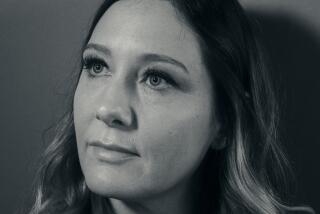MOVIE REVIEW : âCLOUDSâ--A MASTERPIECE REVISITED
Like a voice from the past or from a faraway country, Mikio Naruseâs searingly lovely âFloating Cloudsâ (Fox International) speaks in accents that might first seem distant or strange. But gradually the passion beneath its surface surges up, shocking us into recognition.
âFloating Cloudsâ--quietly eloquent, immaculately crafted--is a 1955 film long regarded as one of the greatest in the history of the Japanese cinema (and now receiving its first general local release). In Japan it was a favorite of critics, the public and most of Naruseâs colleagues. It represents the long-neglected master at the peak of his craft and art. In the lead role--a classic portrayal of a woman obsessively in love with an unworthy man--Hideko Takamine gave her most unforgettable performance.
Like much of Naruseâs great work in the 1950s and â60s, it has a continuity as seamless as life itself. But the life it shows is dark, bleak. Based on Fumiko Hayashiâs novel, the film is set in post-World War II Japan, and it deals with a populace as scattered, drifting and buffeted as the clouds of the title.
The central couple, Yukiko (Takamine) and Tomioka (Masayuki Mori, of âRashomonâ and âUgetsuâ), met during the war at a Vietnam forestry mission. For Tomioka, it was one of many casual seductions; for Yukiko, obviously, it was much more. Tomioka, as Mori plays him, seduces by insults, masks his emotions and affects a weary callousness. Yukiko at first is seemingly shy, vulnerable as a spring day. His barbs pierce her heart, and she succumbs to him like a flower bursting open.
One of the ironies of âFloating Cloudsâ is that we barely even see--except for brief moments, in flashback--that time of âhappinessâ in Vietnam. Instead, we see the warâs aftermath, the turmoil and poverty of late-â40s Tokyo--and, for Yukiko, one crushing disappointment after another. Her lover is both married and a compulsive philanderer; Japan, in its postwar convulsions, has barely a place for either of them. Outside, the streets have a a melancholy vitality (Naruseâs evocation of the postwar mood is superb, created by discreet glimpses around the edges). Life has little hope to offer, but one Yukiko seizes is that Tomiokaâs love can be regained.
Much of the powerful effect of âFloating Cloudsâ comes from a paradox. Though Yukikoâs posture seems abject, she is in fact far tougher than he. Their outer and inner aspects are profoundly different. On the surface, Tomioka is callous and cold, but beneath it, vulnerable and tender, a weakling who cannot survive as well as she.
There is a lonely, dogged heroism about Yukikoâs struggle. In a sense, both of them are trapped in traditional imagery--the brusque, cynical and unapproachable male; the submissive female, worshipful unto death--that contradicts their true characters (possibly he flees her because he feels unworthy). These undercurrents are the source of the storyâs true pathos and tragedy, and audiences who follow only the surface may foolishly dismiss âFloating Cloudsâ as an obvious tear-jerker with retrograde sexual stereotypes.
Like many Naruse characters, Yukiko and Tomioka are walled in. Trapped in society and in themselves, playing too well their demanded cultural roles, they are helpless when the culture collapses: chained to their rituals and damned by their dreams.
Naruseâs greatness as a director--and he is the peer of Kurosawa, Ozu and Mizoguchi--comes from unobtrusive virtues. He is a master of construction, detail, editorial rhythm; of understated emotions and unsparing glimpses of life and people as they are.
One moment of astonishing poignancy and beauty in âFloating Cloudsâ is its justly celebrated last scene. Itâs tempting to say that if Naruseâs last tableau does not make you cry, your heart has withered. But tears donât always supply a true measure. Letâs leave it at this: âFloating Cloudsâ is a film masterpiece on obsessive love to set beside Ophulsâ âLetter From an Unknown Womanâ and Truffautâs âThe Story of Adele H.â It is a âwomanâs storyâ that far transcends that limiting definition.
âFLOATING CLOUDSâ
An East-West Classics release of a Toho Company production. Director Mikio Naruse. Script Yoko Mizuki. Camera Masao Tamai. Art direction Satoshi Chuko. Music Ichiro Saito. With Hideko Takamine, Masayuki Mori, Mariko Okada, Isao Yamagata, Daisuke Kato.
Running time: 2 hours, 3 minutes.
Times-rated: Mature.
More to Read
Only good movies
Get the Indie Focus newsletter, Mark Olsen's weekly guide to the world of cinema.
You may occasionally receive promotional content from the Los Angeles Times.










